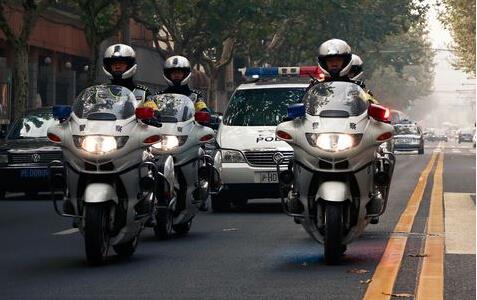POLICE AND CRIME
Living in Shanghai is generally safe when compared with other large urban areas around the world, and most foreigners rarely experience anything more serious than pickpocketing or a minor scam. The robust police and security presence throughout the city, particularly in wealthy and tourist areas, seems to deter most serious crimes. Petty crime, on the other hand, does occur with some regularity. The most common crimes are pickpocketing, credit card fraud and financial scams that often target foreigners. The glaring income disparity is the likely root cause of most of the economic crime experienced in Shanghai. However, compared to similar cities worldwide, the incidence is far lower. Violent crime exists in Shanghai, but it's relatively rare and gains significant media attention. Stories of theft or home invasion often emerge in the period just prior to Chinese New Year when financial obligations are highest.
When visiting Shanghai, you should always take routine safety precautions and pay attention to your surroundings. According to the US State Department, petty theft remains the
most prevalent type of crime and pickpockets target tourists at sightseeing destinations, airports, markets and shops. Make sure you guard your wallet and passport, as most incidents tend to involve items kept in back pockets, backpacks or bags/ purses swung over a shoulder or set down in a vehicle, restaurant or shop. Also, beware of unregistered taxicabs. There have been complaints of these taxis taking off with luggage or charging exorbitant fares.
Narcotics-related crime and use are on the rise in China. Chinese law enforcement authorities have little tolerance for illegal drugs, and they periodically conduct widespread sweeps of bar and nightclub districts, targeting narcotics distributors and drug users. Expats from various countries have been detained in such police actions.
Police response to foreign victims of crime depends upon the type of infraction, where it happened and the social status of the victim. Police in Shanghai are generally far better equipped than those in second-tier cities or rural areas. Most responses to emergency calls are sufficiently prompt if the police are informed that the victim is a Westerner (regrettably, non-Western foreigners are not always given as much attention) or person of importance. In some cases, local police authorities will serve as a mediator between the victim and criminal to agree upon financial compensation (sometimes in lieu of jail time). If you're the victim of a crime anywhere in China, contact the police by dialing 110 regardless of location (English-language capabilities will vary significantly). Furthermore, contact your consulate, where officers can recommend appropriate medical facilities, provide contact information for local attorneys, notify family members and explain how to transfer funds to China.

SHANGHAI'S UNDERWORLD
The pervasiveness and influence of the Chinese underworld in Shanghai's history and development can hardly be understated. Shanghai's climate of hedonistic appetites, political ambiguity and capitalist free-for-all turned out to be the perfect breeding ground for organized criminal enterprises. The onset of industrialization in the late 19th century attracted throngs of economic migrants to Shanghai, constituting an economic underclass ripe for recruitment. In fact, Shanghai's most binding laws were those of the underworld, which demanded unswerving loyalty and maintained a well-defined command structure.
The modern Chinese triads, which reportedly have 1.5 million members in mainland China and an additional million scattered across the world in Hong Kong, Vietnam, Macau and Taiwan as well as countries with significant Chinese populations such as the US, the UK, Singapore and Malaysia, owe much of their form to Shanghainese predecessors.
The most notorious of Shanghai's early gangsters was Huang Jinrong, or 'Pockmarked' Huang, who had a pitted face resulting from a childhood bout with smallpox. Not only was Huang the most powerful gangster in Shanghai as the leader of the Green Gang, he also held the highest rank in the French Concession police force. Huang was able to rule the underworld with impunity, and the French authorities were happy to cede power as long as the most important crimes were solved, that is those affecting French or other European interests. So highly did the mobster-detective chief's French employers value his policing skills that they occasionally relied on him to resolve cases outside Shanghai; he once famously rescued a French bish-"P kidnapped by bandits. When not fighting crime for the police, Huang amassed a fortune through prostitution, drug-running, smuggling and political kickbacks.
the real godfather of the Shanghai underworld, however, was Du Yuesheng, or 'Big Ears' Du. A native of the then-sleepy settlement of Pudong, Du was recruited by Huang to work for the Green Gang across the river and rose through the ranks quickly as a capable opium smuggler. By 1927, Du was the head of the Green Gang and controlled all of Shanghai's prostitution, drug-running and labor rackets. The Green Gang profited handsomely after opium was formally outlawed. It helped that Du, supposedly in recognition of his role in maintaining law and order, became a member of the Board of the Opium Suppression Bureau. One contemporary writer, Han Suyin, called Shanghai so unabashedly amoral as to make "the Chicago of Al Capone appear a staid, almost pious, provincial town".
The Green Gang also worked with Chiang Kai-shek's Kuomintang, which accepted kickbacks from the drug trade after the creation of the Opium Suppression Bureau. Du's money also supplied the anti-Japanese resistance movement during the occupation while Du was reportedly head of the Chinese Red Cross. After the Communists drove the Green Gang out of Shanghai in 1949, Du settled in Hong Kong and died a millionaire philanthropist in 1951.
